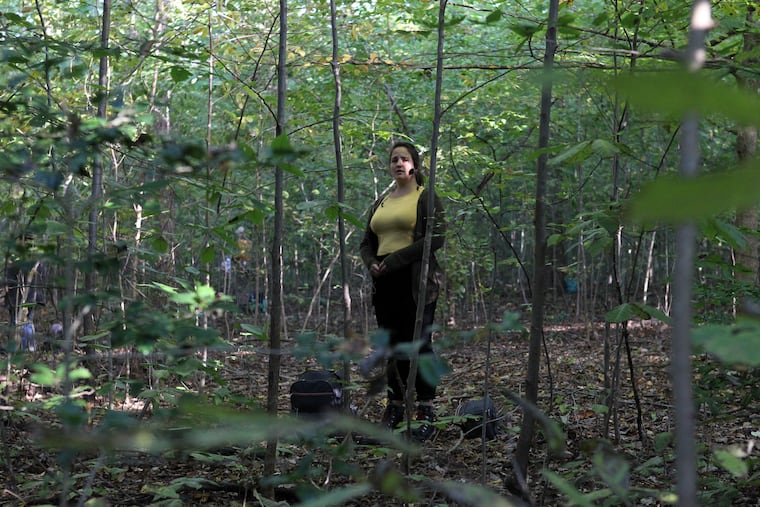A choir. Some trees. Add a new amplified sound system and you have a COVID-19-era concert format.
Philadelphia's Grammy-winning choir The Crossing sang Saturday at Bowman's Hill Wildflower Preserve, near New Hope. The walk-through concert repeats Sunday evening.

NEW HOPE — Makeshift creativity during the lockdown always gets an “A" for effort, whether homemade opera videos or streamed living room recitals. But are they good?
The Crossing choir’s latest project, The Forest, premiered in the wooded thickets of Bowman’s Hill Wildflower Preserve in New Hope on Saturday, was among the few clear-cut successes on every level, a piece that’s not a make-do for lack of traditional concerts, but something that couldn’t have been imagined in other time and is fully realized on a high level.
The melding of voice, words and technology was seamless as you slowly walked through a prescribed path in the wildflower preserve, with each of The Crossing’s 24 singers at an individual station. They were positioned back from the trail but wired and connected with a speaker that resembles a well-varnished fence post that stood right next to the path with true-to-life sound quality, almost as if you were hearing it inside your head.
Through the use of sound loops, each singer created a personal texture with three layers: conversational solo-voice singing, whispered words, and underlying humming. The effect was that of a half-formed song accompanied by whispered secrets but anchored with a drone. Though not strictly interconnected, the singers created a collective sound that was diaphanous but too spare to be merely pretty. Also apparent was an overall tension-and-release contour, and a refrain-like return to the emblematic sentence, “a collection of trees” reminding you that what you take for granted is actually far beyond your comprehension.
A group-written piece, The Forest was built out of words from individual Crossing members (they are an articulate bunch) with two guiding themes: loss (whether loved ones or ways of life) and connecting with nature in radically altered ways, as suggested by the essay “Mind in the Forest” by Scott Russell Sanders. The world’s major religions, Sanders suggests, were all formulated in deserts, thus looked to the sky for divinity rather than the ground where, in non-desert circumstances, so much divinity was all around. The music was composed by Crossing founder Donald Nally and assistant conductor Kevin Vondrak in a manner suggesting early-Monteverdi opera recitatives — heightened speech, in other words.
The total package might seem fairly cerebral but instead had quiet emotional impact. Words were well-chosen and thoughtfully inflected by the music. Much of it felt elegiac. One heartbreaking sentence: “I miss a world of sound with me living in it” looked back through a post-apocalyptic lens. The only problem is that I didn’t want to leave but had to because other listeners — who entered the piece at socially distanced intervals — were trailing behind.
My appreciation was heightened by having seen similar endeavors go less well. Among environmental pieces, Peoples Light theater company’s Lost in the Meadow in 2015 at Longwood Gardens was more distancing than inviting. David Lang’s Mile-Long Opera, with a format similar to The Forest last year on New York City’s High Line, was more dispersed and less immediate. Though only 25 minutes long, The Forest truly felt like a journey, and one in which the many layers of expression mirrored the multi-ring-circus thought process that goes on in my head.
» READ MORE: ‘We wanted to spread a little joy’: Friends stage ‘The Sound of Music’ in a Shore town crosswalk
The piece’s life beyond this weekend of sold-out performances is wide open: The dress rehearsal was shot on video. Alternatively, The Forest could be done with pre-recorded voices and be presented like an art installation (though I’d so miss the presence of the singers).
The miracle is how well it came together so quickly. The custom-made sound system — called Echoes, and costing $64,000 — worked flawlessly and will be used in future Crossing pieces that respond to current social concerns. Though this wildflower refuge seemed made for the piece, it was only secured three weeks ago. As the preserve’s executive director, Peter Couchman, put it, the unpredictability of current times demands a “might as well try it” mentality. And they certainly did.
The program repeats Sunday, in a sold-out performance with start times between 4:30 and 5:30 p.m. Details at crossingchoir.org.